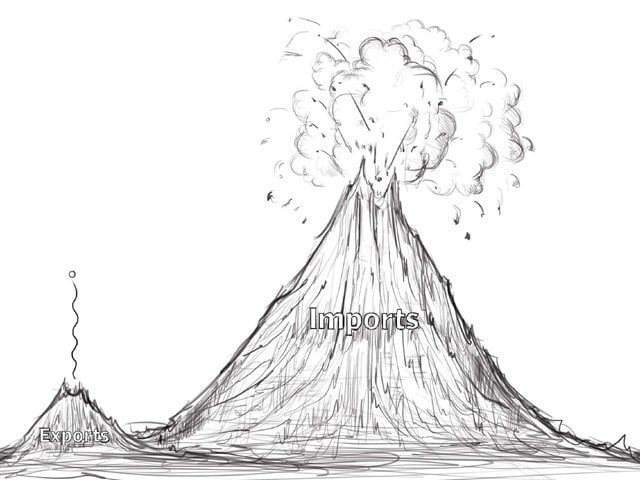The commandment of economic domination: Covet thy neighbour’s markets
To achieve economic independence, Pakistan must look at all markets, be they Muslim or non-Muslim.

While Pakistan’s imports from India have grown at an average of 4% annually between 2007 and 2011, India’s total exports during the same period increased by a much higher 18% per annum.
ILLUSTRATION : ANAM HALEEM
We have heard umpteen times that Pakistan can become independent of the West’s economic dominance only by increasing trade with brotherly Muslim nations while shifting its focus away from the United States and Europe, which collectively purchased almost 35% of Pakistan’s total exports in 2011.
Should we indeed try to build trade ties primarily with Muslim countries and forego the opportunity to nurture regional trade with emerging economic powers, such as India and China?
“Regional trade is always beneficial. I believe the reasons for minimal bilateral trade between Pakistan and India are purely political,” said economist Dr Kaiser Bengali while speaking to The Express Tribune.
“There is a group of people with a religious bent that do not want regional trade to grow. They constantly peddle myths about benefits of increasing trade with Muslim economies mainly because they have an anti-India mindset,” he added.

Pakistan’s imports from India were $1.6 billion in 2011, which constituted only 3.7% of total imports that year. While Pakistan’s imports from India have grown at an average of 4% annually between 2007 and 2011 – the latest year for which data is available on the World Trade Organisation’s (WTO) website – India’s total exports during the same period increased by a much higher 18% per annum.
More dismal are Pakistan’s export figures for India. While India increased its total imports between 2007 and 2011 by 17% annually, its imports from Pakistan witnessed an annual decline of 4% during the same period. Pakistan’s exports to India in 2011 were $272.8 million, which were only 1.1% of total exports that year.
SAARC
Pakistan’s exports to the eight member-countries of the South Asian Association for Regional Cooperation (Saarc) increased to $1.6 billion in 2011 from $659 million in 2007. Although the annualised rate of increase is 25.6%, it is practically negligible because of the low base effect. Pakistan’s exports to Saarc countries were 6.5% of its total exports in 2011 as opposed to 3.7% in 2007.
Pakistan’s imports from Saarc countries in 2011 were $1.8 billion, which rose from $1.7 billion in 2007, showing a nominal increase of 1.4%. Meanwhile, Pakistan’s overall imports from the world increased at an average of 7.5% annually between 2007 and 2011, which reflects a lack of focus on regional trade on Pakistan’s part. The share of imports from Saarc countries in Pakistan’s total exports in 2011 was 4.2% as opposed to 5.3% in 2007.
Tea imports
As an example of how increased regional trade will be beneficial to Pakistan, Bengali says importing tea from Kenya makes little sense when we can get it from India more easily. Pakistan’s imports of tea grew 15% annually between 2007 and 2011. Out of Pakistan’s total tea imports of $350 million in 2011, the share of Kenyan tea was 61.4%, or $215.5 million. In contrast, Pakistan’s tea imports from India were much lower at $37.3 million, representing a share of only 10.6% in the country’s total tea imports in the same year.
This is despite the fact that Pakistan imported Kenyan tea at an average rate of $3,264 per ton as opposed to Indian tea that cost $2,489 per ton on average, according to the WTO.
“Just see how much money we could have saved had we had normal trade relations with India,” Bengali said. “Once I addressed a group of military officials. Almost all questions that they asked me were about increasing trade ties with Muslim countries. They missed the point that trade is based on money, and money knows no religion.”
Published in The Express Tribune, February 4th, 2013.
Like Business on Facebook to stay informed and join in the conversation.



















COMMENTS
Comments are moderated and generally will be posted if they are on-topic and not abusive.
For more information, please see our Comments FAQ